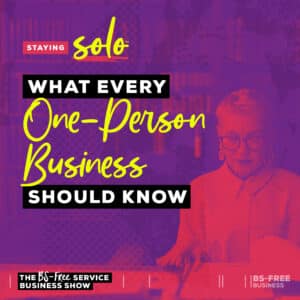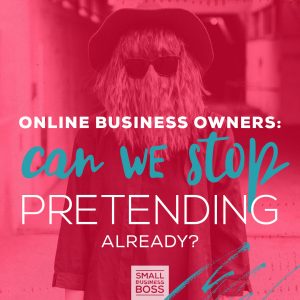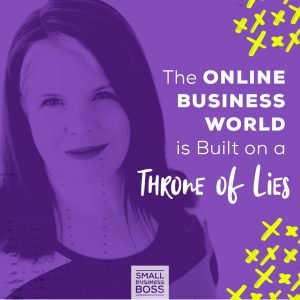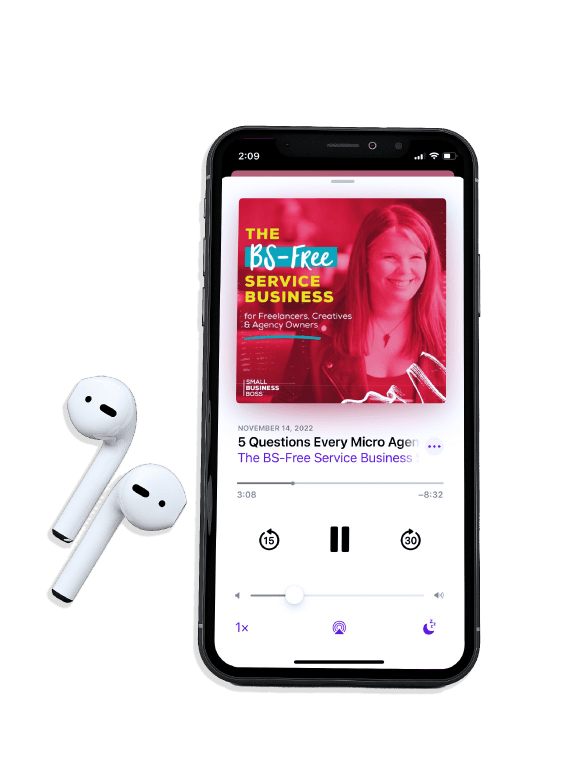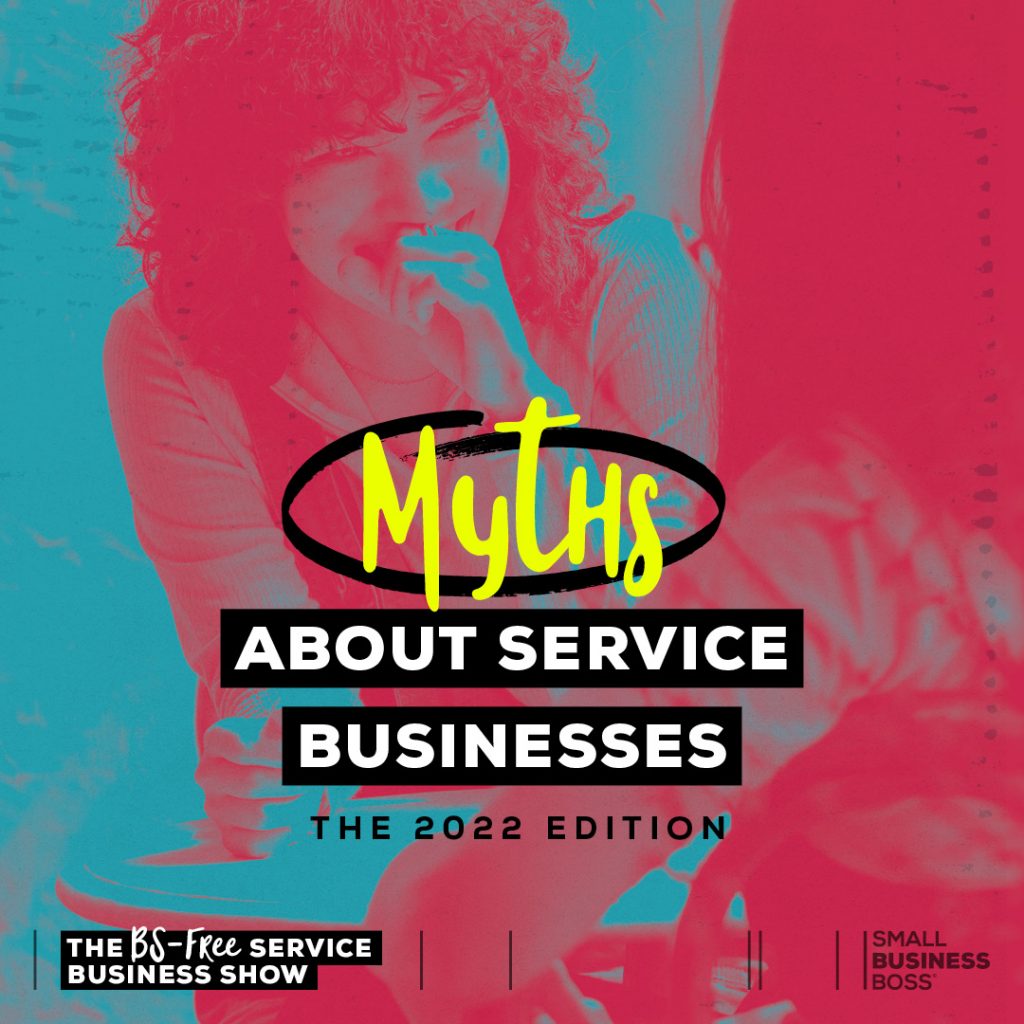
Search the site:
Myths About Service Businesses (The 2022 Edition)
With any business, you don’t always know what you don’t know. So when certain things about service businesses get repeated over and over again by celebrity entrepreneurs, it’s no wonder that you start to wonder if it’s inevitable. Or that it must be happening to you.
Nothing could be further from the truth.
In this episode, we’re looking at being booked out, burnt out, and other lies about service businesses.
I’m back, and our spring season starts today! We’ll be focusing in a big way on strategy and offers for your service business. I definitely have a few longer episodes planned on trends and topics in online business, but we’re going to start off by focusing on the need to know for service businesses right now.
You’ve probably heard me talk about how I was a freelancer for a long time before I found the online business world, and how I lived in this little bubble. In hindsight, I realize what a simple, easy place that was to be because I didn’t have much external input into my business.
But then I found the online business world which is all about providing you with guidance and advice for how to grow your business and make more money. While it opened up my eyes to things like that I should probably raise my rates and the possibilities for growing my business.
On the flip side, it messed with me in a big way in those first few years. Sure, there’s the relentless focus on making more money and how messed up that is, but there are a lot of more subtle things that I file under the problems invented by celebrity entrepreneurs to sell their course/coaching/program to us.
Myths About Service Businesses Abound
The longer I spend in the online business world, the clearer it becomes to me that these messages and stories are designed to create a need for these offers. They’re designed to create a problem that their offer can solve.
Service business owners are targeted as they’re a big segment of the market, and naturally, are an easy target to sell the dream of a different business model that’s more passive or leveraged.
That’s why we have these myths about service businesses that have reached legendary status in the online business world.
In a recent competitive messaging analysis where I looked at sales pages and websites from people who are potential alternative solutions to my offers.
It was illuminating as the same messages appeared over and over again about burnout, being booked out, seeking freedom, income ceilings and more. This wasn’t just a couple of people, it was in the double digits.
While there’s a kernel of truth in these messaging, they’re also exaggerated and oversimplified solutions are offered that don’t even work for most of us.
I’ve tackled these myths previously here on the show, so some of these may be familiar, and I’ve added a few new ones for 2022.
Myth #1: You’re Going to be Burnt Out
I wanted to tackle this one first as it was one of the most common ways that offers targeting service business owners are positioned. In the last year, I’ve saved hundreds of examples of this message in action, and honestly, it pisses me off.
I want to acknowledge that burnout is very real. Especially now, and that’s a big reason that this message pisses me off. It’s opportunistic and has the potential to take advantage of people who are extremely overwhelmed and completely depleted.
Burnout does happen to service business owners, but it can happen to any type of business owner. It’s not unique to service business owners, yet it’s often pitched that if you offer a course or program you’ll have a one-way ticket away from it.
That’s flawed logic. The last thing someone who’s burnt out is for them to essentially start over with a new business model. For them to have to run their existing service business while pivoting into courses or programs.
Ask me how I know? Oh, that’s because I’ve lived it. And all I got was way more work to do while wasting literal thousands of dollars and hundreds of hours of my life.
The simpler solution is to look at what’s causing that stress and burnout in your service business and make small, subtle shifts overtime to fix that. When I first start working with my clients, there are usually a handful of minor changes they can make that make all the difference.
That can be things such as pricing, proposals, hiring, systems or even boundaries. It’s not these massive overhauls of your business that require you to invest $5k or $10k to learn “strategies” from people who aren’t even running a service business. Or that are trying to convince you that becoming a coach will be easier than done-for-you services. Or that moving to a one-to-many model will be easy street and that it’s just like a service business.
Do you see how messed up that is? First, we should not be taking our business strategy from people who don’t run a service business (and spoiler a one-to-many program is NOT a service business) or haven’t run one in years.
The other thing to consider is if you should be taking this pop culture celebrity entrepreneur one-size-fits-all advice for your business. Especially when they don’t know the intricacies of your specific market or offerings. (And don’t even start me on how they don’t understand the difference between B2B and business-to-entrepreneur businesses.)
If you’re feeling burnt out, the solution is most likely in the small things. Not burning your business down chasing after bullshit online business dreams.
Myth #2: You’re Going to be Booked Out
As a service business or any business really, we’re bound by capacity. There’s a limit to what we can really do because of time and energetic limitations.
This is where the idea of “being booked out” comes in. At a certain point you can’t take on more clients, and you may be maxed out.
That’s just reality. But it’s maybe not the reality that it’s painted to be by people out there pitching you on their offers.
As a service business, you’ve always got ways you can build capacity. You can hire. You can raise your prices, You can change markets. There are countless levers you can pull in order to increase your revenue.
Being booked out, and bumping up against an income ceiling happens, but it’s not a given. You’ve got choices, and it doesn’t always require you to do something dramatic.
Remember that next time someone is trying to sell you hard on their offer promising you that you’ll bust through the income ceiling. It’s complex and nuanced, and something that requires strategic thought about what you really want in your business.
These cookie-cutter solutions are built on the idea that you MUST scale your business or hit certain income goals. And really, maybe that’s not what you want from your business.
Maybe the more interesting scenario is for you to make the same amount of money while working less. Or for you to work with clients that do more strategic work. It’s not always about making more money.
I know for me that I was very content with how much money I was making before I was in the online business world. The constant focus on making more and more money can easily derail us from what’s important to us and our values.
Don’t let anyone define what success looks like for you. Take the time to figure that out for yourself based on your values and needs, and you may discover that you’re exactly where you want to be with your revenue and take-home pay.
Myth #3: You Should Want to Double Your Business
Speaking of money, online business is full of these tropes about online business growth and the goals we should hit. Six or seven figures, and the idea that we should be working to double our business year over year.
I get it. These things sound good on a sales page. And for a long time, I bought into it. I thought it was desirable.
With the benefit of hindsight, I recognize now how I was relying on external validation to tell me I was a legitimate business owner.
I’m going to let you in on a little secret. Even after all these years as a business owner, I STILL don’t feel legit at certain times. I feel like I’m pulling a fast one on everyone. But, that’s also a lot like what it feels like to be an adult and I’m still trying to figure out how I’m qualified to parent a nearly 18-year-old.
So when you think about these money tropes, like doubling your business, it may be a matter of thinking that’s what you should want. Or that is what it’s going to take for you to be legit.
Truth? No external measure of success is going to legitimize you as a business owner. Believe me, I’ve tried. Nothing magical happened the year I more than doubled my business.
In fact, I’m not sure I’d recommend that experience to anyone. It’s seen as desirable, but no one talks about it how having more than 100% year-over-year growth breaks things in your business. And that type of growth is not simple, let alone sustainable.
If you look at the outside world with non-online businesses, things like 10% or 15% increases are seen as healthy. Yes, our businesses have the ability to scale differently, but should we really aspire to that?
And if you’re not 100% convinced that doubling your business isn’t the goal you should aim for, consider the simple fact that doubling your business doesn’t mean double the money for you.
It may mean more expenses and more headaches. It may mean reducing your take-home pay. Or less time away from the business. So you need to consider what you’re really trying to do.
Myth #4: You’re Not Serious If
This next one is one that’s bugged me for a long time, but I don’t think I’ve ever talked about it. It’s the idea that for you to be “serious” about your business you’ll do certain things.
Talk about a bunch of marketing spin. There’s no one way to run a business, especially a service business. This is highly prescriptive advice designed to make you think that you need to do something specific based on some celebrity entrepreneur’s way of doing things.
The “you’re not serious if” myth shows up in so many ways, but a prime example is how it’s used to push you into investing in things. Or to tell you that you need to do things a certain way or use a specific tool.
A great example is when I bought a CRM/email automation tool thinking it mean I would be serious about my business. Guess what? Spending that money didn’t mean I was serious, it meant I was spending a lot of money on something that wasn’t doing anything to help me actually grow my business.
Total waste of time and money, and it definitely didn’t make me any more serious about my email marketing.
Your business. Your rules. You can decide if you’re serious or not. I mean, I’m committed to my business, but I’m not all that serious about it, as that sounds stressful and kind of miserable.
This may seem like semantics, but I work with so many service business owners who feel less than thanks to this prescriptive advice about the way things should be done.
Instead of being “serious” what if we aim to be something else that’s more aligned with who we are as people and that’s aligned with our values.
For me, I focus on being professional. Sure I keep it real with Small Business Boss, but you can bet that I’m always a total pro. That’s a big part of who I am. Does that mean I’m perfect? Hell no.
What it does mean is that I think carefully about what I do and say so that I’m coming from a place of help, not harm. That my reputation matters.
Because so much of what I see as being positioned as being “serious” about your business is toxic. It’s about the hustle and extracting more money from people which is not how I want to run my business or live my life.
Myth #5: Automation is Everything
Here’s another myth that I’m not sure I’ve really talked about before, and it’s around automation.
So much of what I see out there for service business owners right now pushes the idea that automation is the key to growth. That automating as much as you can of your processes is critical to success.
I disagree wholeheartedly which is why I included this on the list.
Listen, if you love your Dubsado or Honeybook, you can keep it, but I wanted to provide some food for thought. And if you don’t have everything automated and feel like you’re missing the boat, you’ll want to hear what I say next.
Automation is great to a point. But it’s often done to the detriment of the client experience.
As a service business, you’re offering a service, and that’s inherently human. People hire you (or you + your team) for well, you. So when you over automate the process it can be jarring and it can feel impersonal.
Yes, I know these systems can be customized and personalized, but it’s not always the same. There are a few breakdowns I’ve seen with my clients, and being on the receiving end of automated processes.
Take something like having a client approve a proposal and then get the contract when it’s automated. It handles the workflow for you, but there’s not much room for customization or adding a personal touch. So you’re either intervening in the process to do that, or you’re simply missing out.
On the receiving end, no matter how many GIFS and emojis you put in the email it can feel cold. Not the first impression you want to make. Your clients know the difference between automation and personalized, high-touch communications.
Another example is that you’re shifting too much onus on the client to understand everything and self-serve. This works great for a course that’s designed to be do-it-yourself, but when you’re spending thousands on something that you want to be high-touch, it’s completely mismatched.
From my point of view, you need to look at the price point of your service, and what the expectations are that go with it. When I sell a half-day intensive, the process is designed to be relatively low-touch until the day of, and that’s aligned with the positioning of the offer. That same approach doesn’t work for my agency clients who are hiring us for content production.
So when I see people out there extolling the virtues of automating everything, I have questions. It sounds great on a sales page and it serves you, but does it serve your clients?
Many times it doesn’t, and I chalk this up to so much of what’s being taught for service business owners losing focus on the client. It’s so centered on the needs of the business owner that the client suffers.
My approach has been to use automation strategically, and only where it matches with what’s being sold. That doesn’t mean we’re wasting a lot of time on things that aren’t automated as they’re still systematized but there’s room for customization and personalization supporting a stronger client experience.
From my point of view, that’s time well-spent by our team. We’re talking about a matter of minutes that improves the client experience.
Finally, when it comes to automation, I feel like the time, energy, and money needed to set up many systems is missing from the conversation. Sure it’s going to save you time over months and years to come, but if you don’t know how to set something up or run it, you’re needing to hire help. Or you’re stuck trying to figure it out yourself which has a cost to you and your business.
You need to really look at if you’re going to truly get ROI out of that automation in the long run. The answer is that sometimes you will, and in others, it’s likely going to be more headache than it’s actually worth for you and your clients.
Ditch the Hype: Focus on the Fundamentals Instead
My goal with this episode was to give you an alternative perspective to so much of the current narrative about service businesses. Trust me when I tell you that these myths are a lot of hype and aren’t actually helping you.
When it comes to your service business, don’t believe the hype and focus on the fundamentals. When you cut through the noise, those basics are what’s going to help you build a simple and sustainable business that truly serves both you and your clients.
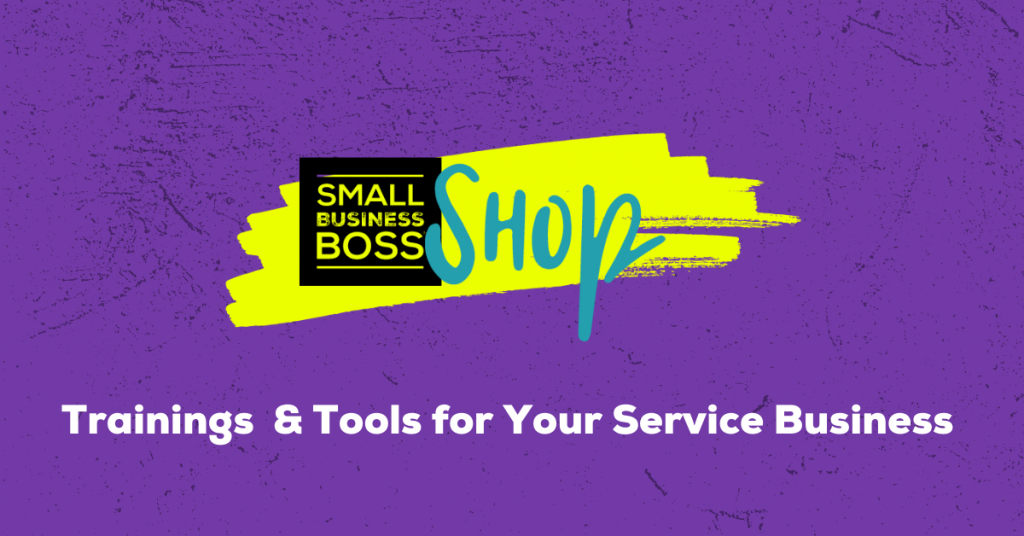

I’m Maggie Patterson (she/her), and services businesses are my business.
I have 20+ years of experience with client services, am a consultant for agency owners, creatives, and consultants, and vocal advocate for humane business practices rooted in empathy, respect, and trust.
Help Not Hype
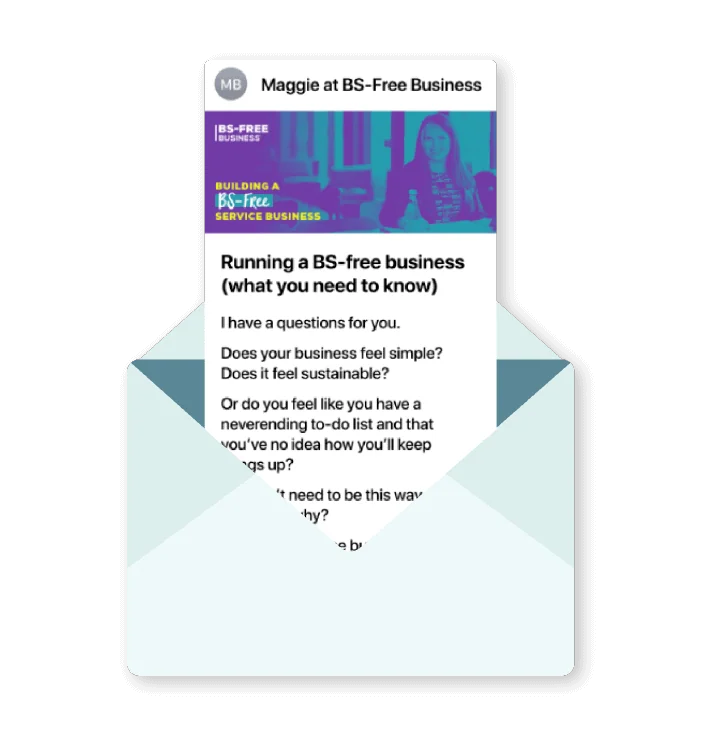
Tired of the same old BS business advice?
I got you with weekly emails packed full of proven strategy that makes a real difference in your service business.

